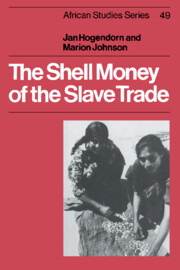Crossref Citations
This Book has been
cited by the following publications. This list is generated based on data provided by Crossref.
Law, Robin
1991.
Computing Domestic Prices in Precolonial West Africa: A Methodological Exercise from the Slave Coast.
History in Africa,
Vol. 18,
Issue. ,
p.
239.
Law, Robin
1992.
Posthumous Questions for Karl Polanyi: Price Inflation in Pre-Colonial Dahomey.
The Journal of African History,
Vol. 33,
Issue. 3,
p.
387.
Van Den Boogaart, Ernst
1992.
The Trade between Western Africa and the Atlantic World, 1600–90: Estimates of Trends in Composition and Value.
The Journal of African History,
Vol. 33,
Issue. 3,
p.
369.
BAKER, WAYNE E.
and
JIMERSON, JASON B.
1992.
The Sociology of Money.
American Behavioral Scientist,
Vol. 35,
Issue. 6,
p.
678.
Richardson, David
1994.
Cape verde, Madeira and Britain's trade to Africa, 1698–1740.
The Journal of Imperial and Commonwealth History,
Vol. 22,
Issue. 1,
p.
1.
Jamieson, Ross W.
1995.
Material culture and social death: African-American burial practices.
Historical Archaeology,
Vol. 29,
Issue. 4,
p.
39.
Guyer, Jane I.
1995.
Wealth in People, Wealth in Things – Introduction.
The Journal of African History,
Vol. 36,
Issue. 1,
p.
83.
Alpern, Stanley B.
1995.
What Africans Got for Their Slaves: A Master List of European Trade Goods.
History in Africa,
Vol. 22,
Issue. ,
p.
5.
Hogendorn, Jan
1996.
Economic modelling of price differences in the slave trade between the Central Sudan and the coast.
Slavery & Abolition,
Vol. 17,
Issue. 3,
p.
209.
Piot, Charles
1996.
Of Slaves and the Gift: Kabre Sale of Kin During the Era of the Slave Trade.
The Journal of African History,
Vol. 37,
Issue. 1,
p.
31.
Gregory, C. A.
1996.
Cowries and Conquest: Towards a Subalternate Quality Theory of Money.
Comparative Studies in Society and History,
Vol. 38,
Issue. 2,
p.
195.
Cook, Constance A.
1997.
Wealth and the Western Zhou.
Bulletin of the School of Oriental and African Studies,
Vol. 60,
Issue. 2,
p.
253.
Barendse, R.J.
2001.
Reflections on the Arabian Seas in the Eighteenth Century.
Itinerario,
Vol. 25,
Issue. 1,
p.
25.
Lynn, Martin
2002.
John Langdon. Three Voyages to the West Coast of Africa, 1881–1884, edited by Martin Lynn.
Camden Fifth Series,
Vol. 19,
Issue. ,
p.
168.
Manning, Patrick
2003.
Navigating World History.
p.
183.
ŞAUL, MAHIR
2004.
Money in Colonial Transition: Cowries and Francs in West Africa.
American Anthropologist,
Vol. 106,
Issue. 1,
p.
71.
Gottlieb, Alma
2005.
Babies' Baths, Babies' Remembrances: A Beng Theory of Development, History and Memory.
Africa,
Vol. 75,
Issue. 1,
p.
105.
Manning, Patrick
2005.
The Cambridge Economic History of Latin America.
p.
43.
Schoenbrun, David
2006.
Violence and Vulnerability in East Africa before 1800 CE: An Agenda for Research.
History Compass,
Vol. 4,
Issue. 5,
p.
741.
Maurer, Bill
2006.
The Anthropology of Money.
Annual Review of Anthropology,
Vol. 35,
Issue. 1,
p.
15.





